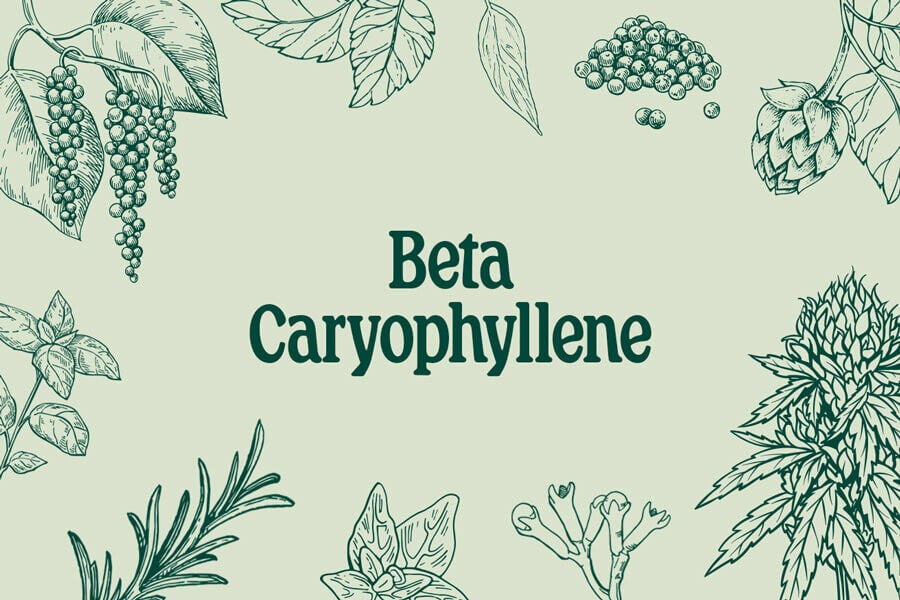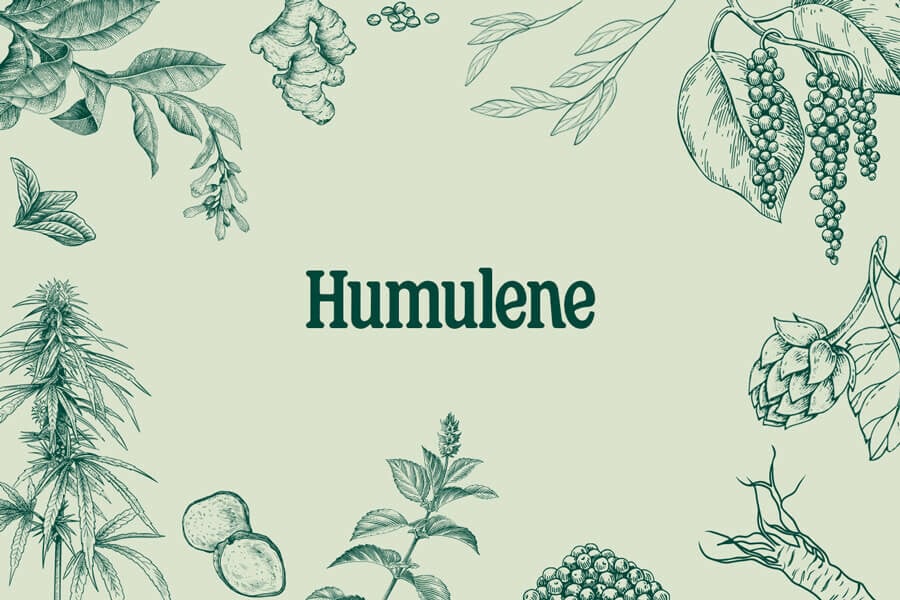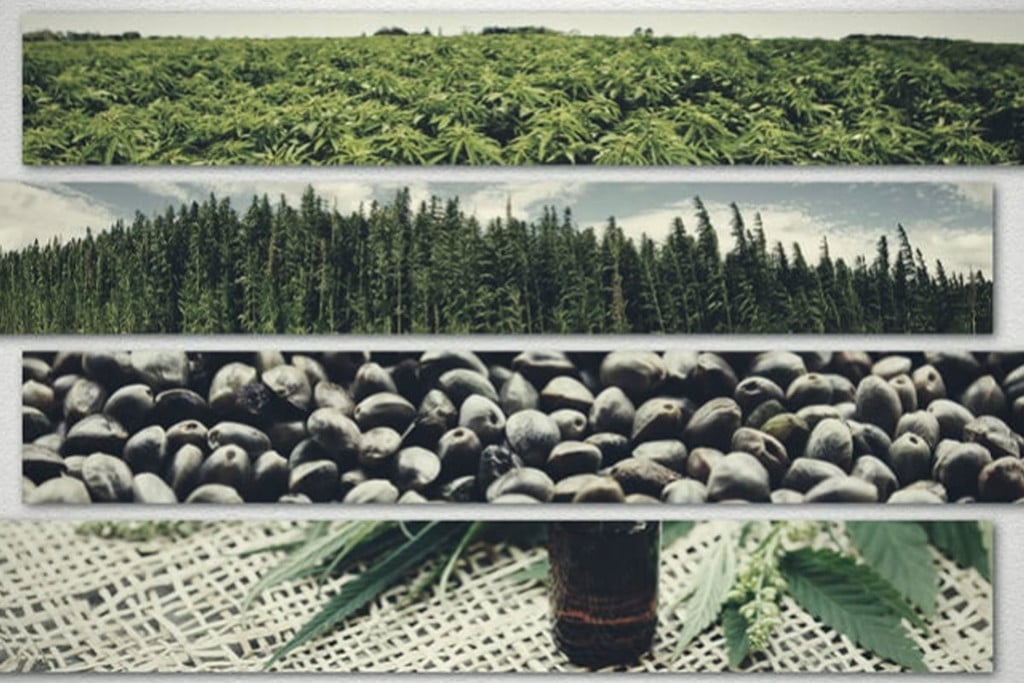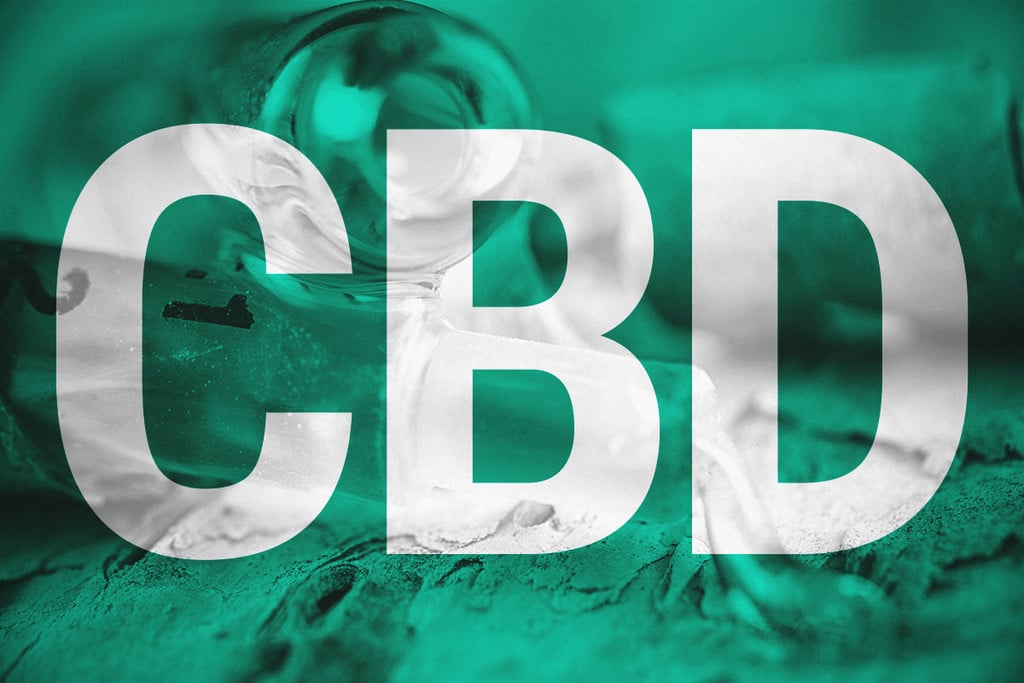.
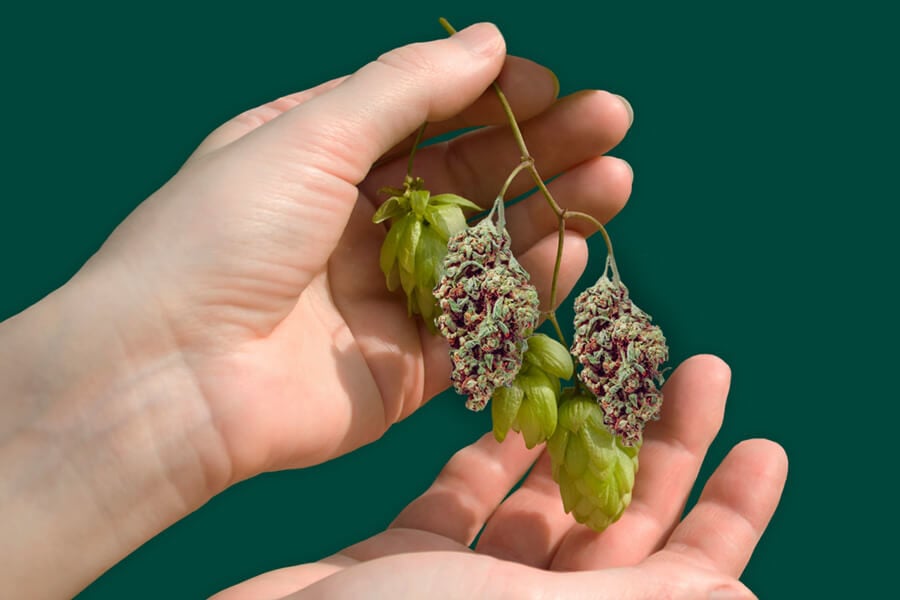
Hops and Cannabis: Cousins of the Cannabaceae
Cannabis and hops belong to the same botanical family. Both plants possess glandular trichomes, feature distinct male and female specimens, and even produce the same terpenes. This striking similarity has helped to stoke rumours that hops, just like cannabis, produces CBD. But where did this claim come from? And what evidence supports it?
Contents:
Cannabis and hops seem like an unlikely duo. However, these two plants share much more in common than you might realise. Both of them belong to the same botanical family and both feature trichomes that churn out similar chemicals. On top of this, cannabis remains one of the most widely used recreational drugs, whereas hops appear in practically every single beer currently available; whether you’re a drinker or a smoker, you’re consuming at least one of these plants every time you fancy tinkering with your brain chemistry.
Recently, new evidence has emerged that placed hops even closer to cannabis on the botanical stage: The presence of cannabinoids. At first, these findings placed hops in a new light. Hopeful entrepreneurs started eyeing up the plant as a non-cannabis source of CBD and other valuable compounds. However, it didn’t take long for this dream—manufactured in part by an unrealistic mastermind—to start unravelling.
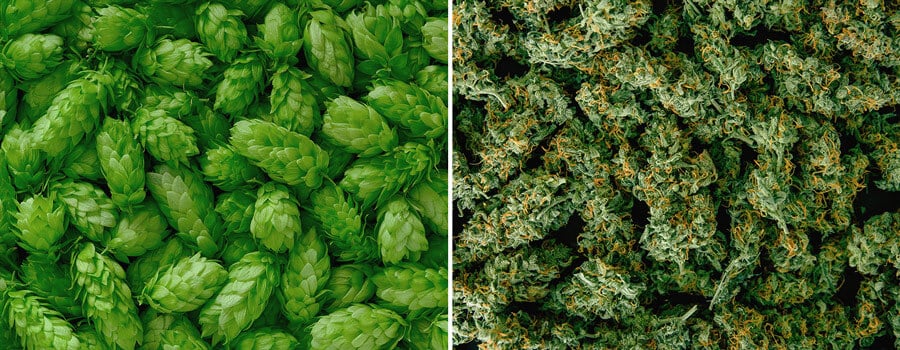
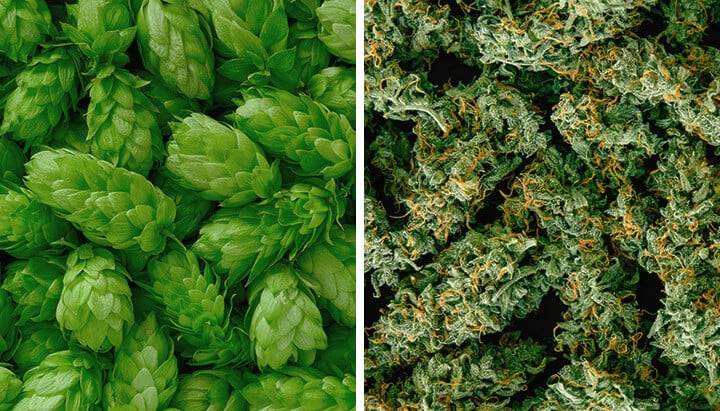
Hemp and Hops: Cousins of the Cannabaceae
There are a surprising amount of plants that look like cannabis. However, despite their appearances, very few are related to the herb. Plant taxonomists categorise species into larger groups based on several factors, including morphological and genetic traits. Some plant families are large in number; the bean family (Fabaceae) contains around 765 genera and roughly 20,000 species; the gourd family (Cucurbitaceae) contains 95 genera consisting of 965 species. In contrast, the hemp family, known as the Cannabaceae[1], contains only 11 genera consisting of 170 species in total.
Both cannabis and hops are the most well-known members of the Cannabacea family. The Cannabis genus consists of a single species divided into several subspecies: Cannabis sativa, Cannabis indica, and Cannabis ruderalis. The Humulus (hops) genus features eight unique species, with Humulus lupulus remaining the most widely used in brewing and apothecary products.
Similarities Between Cannabis and Hops
Cannabis and hops certainly possess wildly different growing habits and morphological characteristics. However, they also share a number of physical traits that contribute to their union under the Cannabacea umbrella. These include:
- Dioecious nature: Both cannabis and hops are dioecious. As opposed to monoecious plants that possess both male and female sexual organs, dioecious species possess only male or female organs on separate plants.
- Wind pollination: Cannabis and hops release large amounts of pollen during gusts of wind, which fertilise nearby female flowers when it makes contact with them. In comparison to other plants, wind-pollinated species rely much less on pollinating insects such as bees.
- Glandular trichomes: Cannabis flowers feature a thick coating of glandular trichomes. These small structures produce many of the secondary metabolites that make the plant valuable, including cannabinoids and terpenes. Likewise, hops also possess glandular trichomes in the form of lupulin glands[2].
- Biosynthesis of terpenophenolic compounds: The cannabinoids found in cannabis, such as THC and CBD are terpenophenolic in structure—part terpene and part phenol. Some of the compounds[3] produced by the lupulin glands of hops plants also fall into this category of secondary metabolites.
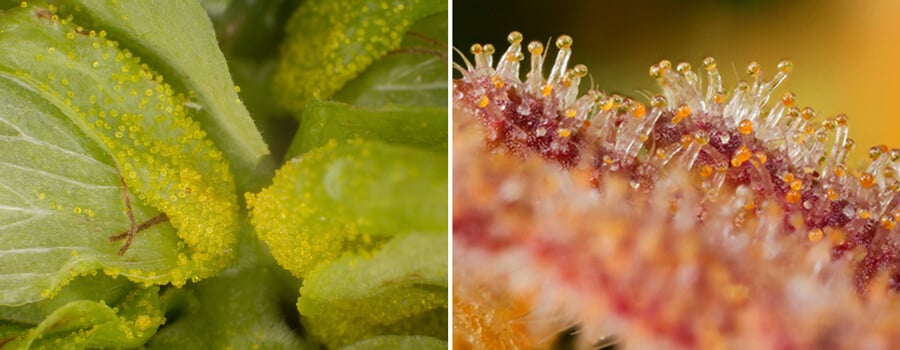
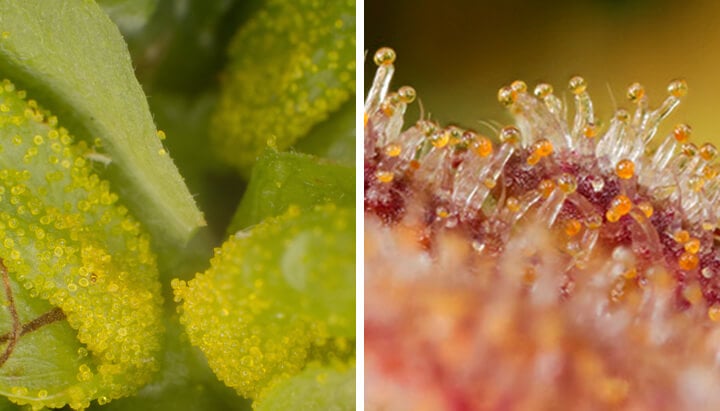
Hops and Cannabinoids: An Analysis
Hops produce compounds that are structurally similar to those found in cannabis, and they also achieve this through biosynthetic pathways in glandular trichomes. But do hops produce cannabinoids such as CBD? To put it bluntly: No.
The genetic code and therefore biosynthetic pathways within cannabis and hops differ. Cannabis possess cellular machinery, namely enzymes and the DNA that codes for them, that are capable of converting precursors into cannabinoid acids. Environmental factors, such as heat, then turn these precursors into cannabinoids such as THC and CBD.
Hops simply lack the DNA necessary to create the enzymes, known as cannabinoid synthases, to convert specific chemicals into cannabinoid precursors. However, hops do synthesise several of the terpenes that appear in cannabis, and some of these compounds impact the endocannabinoid system—the network that THC and other cannabinoids activate. Before we get into this fascinating topic, let’s first discover how hops quickly rose and fell as a promising source of cannabinoids.
Hops Unveiled: Unmasking a Deception
A United States Plant Patent filed in 2020 almost changed the world of cannabinoid manufacturing forever. The authors of the document[4] disclosed the properties of a new species of hops named Humulus Kriya originating from the cross-hybridization of feral Humulus yunnanensis varieties found in Pekong, India.
The patent contains chromatography data for several Humulus Kriya samples and claims that the method of molecular analysis uncovered the presence of cannabinoids previously found in cannabis. These include cannabigerol (CBG), cannabichromene (CBC), cannabidiol (CBD), cannabielsoin (CBE), and cannabidivarin (CBDV).
Even before the filing of this patent, the researcher behind these findings—Dr. Bomi Joseph—had entered into agreements with CBD companies and even started working on specific hops-CBD products. The idea that hops contained CBD and other cannabinoids had the industry abuzz. A plant containing CBD, lacking THC, and without the regulatory stigma of cannabis, could have proved a botanical goldmine. However, this house of cards quickly came tumbling down.
A review article[5] published in Sage Journals in 2022 called this scheme “..a remarkable example of forgery and fraud, worth recapping to give an idea on how commercial interests and a largely unregulated market like the one of ‘dietary’ phytocannabinoids can foster pseudoscience”. This scathing response came about following the discovery that Joseph’s work was little more than a sham. The original research appeared in a conveniently newly created scientific journal, the article plagiarised existing CBD literature, and Joseph himself turned out to be a con artist already known to law enforcement.
Hops and Cannabimimetics
Hops don’t contain CBD, but that doesn’t mean they don’t work in a similar way to cannabis in the body. Species of hops produce large quantities of aromatic terpenes—the reason why brewers use them in beers. Of all of the terpenes found in hops, the molecule humulene is one of the most dominant. A 2021 paper[6] published in the journal Scientific Reports found that humulene, alongside pinene, linalool, and geraniol, all activated the CB1 receptor in cell studies–the same site that THC activates to produce some of its effects. Because of the way they interact with endocannabinoid system receptors, researchers have given the title “cannabimimetics” to these non-cannabinoid compounds.
Do Weed and Hops Work Together?
Hops contain plenty of terpenes, and emerging research suggests that cannabinoids and terpenes work side-by-side to amplify each other’s beneficial effects. Following this logic, it makes sense that weed and hops hold promise as a therapeutic combination. Keep reading to take a look at what the research says.
A Synergy in Theory
Until relatively recently, cannabis and THC remained synonymous—a fact made evident by breeding efforts focused almost solely on higher concentrations of the cannabinoid. However, recent research has driven a wedge between the compound and the plant, revealing that many other factors contribute to the overall effects of each strain.
The developing theory of the entourage effect posits that many different constituents found in cannabis work in harmony to produce different outcomes. Think about this: Almost every modern hybrid contains high levels of THC, but many of them exert a different subjective effect. Why? Because they possess varying levels of other phytochemicals, including terpenes.
Early research suggests that different terpenes amplify the effects of different cannabinoids. There are over 150 terpenes and 100 cannabinoids present in cannabis, all expressed in varying concentrations in different strains. The recognition of the entourage effect has caused many consumers to move away from a THC-centric preference when growing weed and isolate products in general, towards an awareness of molecular synergy and a consumption of full-spectrum products.
A Pairing in Practice
So, we know that hops don’t contain cannabinoids, but do produce terpenes. We also know that terpenes and cannabinoids share a synergistic relationship that equates to a modulation of the subjective effects of the herb. In theory, when combining hops and cannabis, we should expect some kind of interplay between the chemical constituents of each plant.
The research remains early in this area and leaves many questions unanswered. To get a better understanding of their dual potential, a team of German researchers co-administered[7] CBD and a terpene-enriched hops extract and applied it to a cellular model of inflammation. Compared to CBD applied in isolation, the dual treatment exerts an additive anti-inflammatory effect, leading the researchers to conclude that pairings of CBD and other phytomolecules could serve as a future treatment of inflammatory diseases.
Granted, this study uses isolated CBD alongside a terpene extract. Although helpful in trying to understand and quantify the effects of specific molecules, it doesn’t reveal the potential effects of full-spectrum extracts used side-by-side. Hopefully, future research will help to illuminate this area of enquiry.
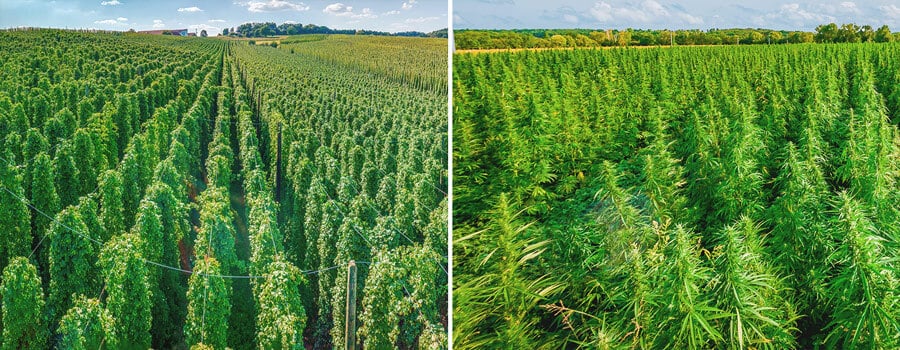
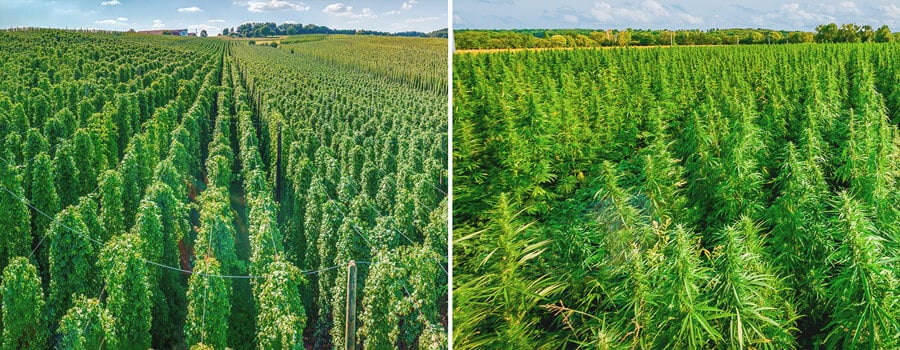
The Link Between Beer and Cannabis
Despite the lack of CBD and other cannabinoids in hops, the plant shares quite a few similarities with cannabis; they’re part of the same botanical family and both contain boatloads of terpenes. The presence of these chemicals creates an unlikely bridge between both cannabis and beer.
When smoking weed, THC forms the core of the experience, but terpenes help steer the overall direction of the high. When drinking beer, ethanol underpins the sensations of being drunk, but hops-derived terpenes also influence the effects, in part due to their sedative[8] action.
Hops and Weed: More Similar Than Different
Despite fraudulent attempts to popularise hops as a source of CBD, the plant contains no cannabinoids. However, they’re packed with terpenes that make them a promising weed-enhancing ingredient in botanical recipes. As more research emerges, we could see manufacturers using hops in weed-based products to capitalise on a cross-species entourage effect.
- Cannabis Systematics at the Levels of Family, Genus, and Species - PMC https://www.ncbi.nlm.nih.gov
- EST Analysis of Hop Glandular Trichomes Identifies an O-Methyltransferase That Catalyzes the Biosynthesis of Xanthohumol - PMC https://www.ncbi.nlm.nih.gov
- https://www.sciencedirect.com/topics/agricultural-and-biological-sciences/humulus
- https://patentimages.storage.googleapis.com/1f/dd/c3/b986f3192c2828/USPP31477.pdf
- https://journals.sagepub.com/doi/full/10.1177/1934578X221098843
- Cannabis sativa terpenes are cannabimimetic and selectively enhance cannabinoid activity | Scientific Reports https://www.nature.com
- Effects of combined cannabidiol (CBD) and hops (Humulus lupulus) terpene extract treatment on RAW 264.7 macrophage viability and inflammatory markers - PMC https://www.ncbi.nlm.nih.gov
- The sedative effects of hops (Humulus lupulus), a component of beer, on the activity/rest rhythm - PubMed https://pubmed.ncbi.nlm.nih.gov
- https://journals.sagepub.com/doi/full/10.1177/1934578X221098843


























